Those who are looking for a nutrient-packed ingredients to substitute for wheat flour will find that coconut flour is an excellent choice. It is also a popular option for those who are avoiding gluten in their diets.
Coconut flour is a type of flour that offers a large amount of fiber along with other essential nutrients. However, coconut flour also has a few drawbacks associated with it.
It often requires you to increase the amount of liquids and eggs in all sorts of recipes. This is why individuals begin to search for a coconut flour substitutes with more benefits and fewer disadvantages.
What is coconut flour?
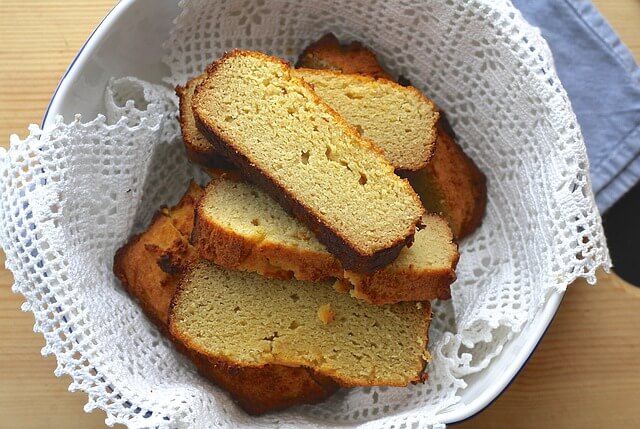
Coconut flour is created during the production of coconut milk. When the coconut is pressed to make milk, there will be bits of coconut meat that remain. The meat from the coconut can be dried out at a low temperature before it is ground into a fine powder that is excellent for baking.
This kind of flour is versatile and often used by those with diets the restrict grains, such as ketogenic diets, paleo diets, and the GAPS diet. Flour made of coconut is protein-rich, gluten-free, and makes a great alternative to regular flours based on grains.How healthy (or unhealthy) is it?
Coconut flour is a reasonably healthy option for most people. It is gluten-free, as well as being high in fiber, fat, and protein. Compared to many other flours on the market, it also contains fewer carbohydrates.
This flour is also rich in manganese, which can support better bone health and make it easier for your body to use nutrients such as biotin and choline. It acts as an anti-inflammatory and contains powerful antioxidants.
Nutritional Breakdown
Coconut flour | Amount (per 100 g) | % Recommended daily intake |
Calories | 400 kcal | 19% |
Total fat | 13 g | 16% |
Saturated fat | 13 g | 89% |
Cholesterol | 0 g | 0% |
Salt | 33 mg | 2% |
Protein | 20 g | 39% |
Calcium | 67 mg | 7% |
Iron | 7 mg | 35% |
Potassium | 1867 mg | 46% |
Fiber | 33 g | 121% |
(Based on nutritional information from USDA.)
What recipes are coconut flour used in?
Most people use coconut flour for baked goods, especially when looking for grain and gluten-free dishes. Some of the most popular recipes used with this flour include a variety of muffins, cakes, bread, and cookies.
It has a high level of versatility but can be hard to use at first. Working with established recipes can help newcomers with its use.
Keep in mind that this flour is very absorbent, so a small amount and absorb more liquid than you might think. Using a larger number of eggs (or egg alternatives for those with vegan diets) can counteract this issue and making basking more straightforward.Why do we need coconut flour substitutes?
One of the significant reasons to consider coconut flour substitutes is because it isn’t a product you will find on the shelves at every grocery store. It also requires changing proportions of other ingredients in a recipe, which can be confusing and challenging for many people who use it.
Thankfully, there are several fantastic substitutes that do not have the same drawbacks as coconut flour.
Note:
🌱 = vegan
1. Almond flour🌱
Best for: pancakes, breading, scones, meatballs, biscuits, cookies, and pasta.
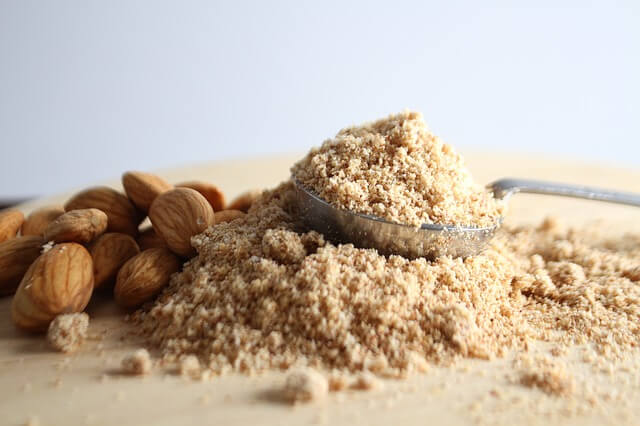
Almond flour is nearly entirely made of ground almonds, so it has essentially the same nutritional value as eating whole almonds. This flour is made using skinned, blanched almonds, and it offers a fine texture, unlike almond meal, which is coarser and has more texture associated with it.
Almond flour contains a large amount of nutrients, including fiber, protein, and vitamin E. It has a consistent grain size, which means you can bake with it in various recipes and except consistent results each time.
Advantages
A single serving of almond flour will include more almonds than most people could ever expect to eat on their own. In fact, one cup of the flour can contain nearly 100 nuts. Just like coconut flour, almond flour is gluten-free and has very few carbohydrates.
It is also exceptional for people with diabetes since it has a low glycemic index. Since this flour is gluten-free, it is a fantastic choice for anyone who struggles with celiac disease. It is also useful for those who prefer to bake without gluten for other reasons.
Disadvantages
While there are many advantages to choosing almond flour as a coconut flour substitute, there are drawbacks as well. One of them is that almond flour tends to be fairly expensive compared to coconut flour.
It’s also not as absorbent as coconut flour, so reducing the amount of liquid in a recipe is required. You’ll also need to use a far more substantial amount of the flour as a substitute, sometimes as much as 400% the amount of coconut flour that you would use.
Nutritional Breakdown
Almond flour | Amount (per 100 g) | % Recommended daily intake |
Calories | 607 kcal | 29.% |
Total fat | 54 g | 65% |
Saturated fat | 4 g | 28% |
Cholesterol | 0 mg | 0% |
Salt | 0 mg | 0% |
Protein | 21 g | 42% |
Calcium | 236 mg | 24% |
Iron | 4 mg | 19% |
Potassium | 679 mg | 17% |
Fiber | 7 g | 26% |
(Based on nutritional information from USDA.)
2. Cassava flour🌱
Best for: tortillas, pot pies, crepes, desserts, and thickening dishes.

Yuca, or manioc root, is the plant that cassava flour is created from. It is gluten-free, like the other ingredients we have looked at, but it has a texture that is very similar to wheat flour.
Another thing that sets cassava flour apart is that it can be used in the same amount as regular wheat flour in many recipes. Cassava flour is popular among those with a paleo diet and is made by peeling, grinding, and grinding cassava root.
Advantages
Cassava flour has a very neutral flavor, so it will fit into any baked goods without adding any tanginess or bitterness. It’s a dry and fine ingredient that can be used for everything from desserts to crepes, tortillas, and thickening dishes that are too watery. Since it is a gluten-free product, it works well as an alternative to coconut flour in gluten-free recipes
Disadvantages
The top downside of using cassava flour is that it has a large number of carbohydrates, nearly as much as wheat flour does. Individuals who are adhering to a diet using low glycemic ingredients may want to choose a different coconut flour substitute for the best results.
In addition, you may need to use more cassava flour compared to coconut flour. It also may be required to reduce the amount of wet ingredients in a recipe.
Nutritional Breakdown
Cassava flour | Amount (per 100 g) | % Recommended daily intake |
Calories | 371 kcal | 18% |
Total fat | 0 g | 0% |
Saturated fat | 0 g | 0% |
Cholesterol | 0 mg | 0% |
Salt | 0 mg | 0% |
Calcium | 57 mg | 6% |
Potassium | 303 mg | 7% |
Carbohydrates | 89 g | 32% |
Fiber | 6 g | 21% |
Sugars | 0 g | 0% |
3. Soy flour🌱
Best for: pancakes, pies, waffles, cakes, and muffins.
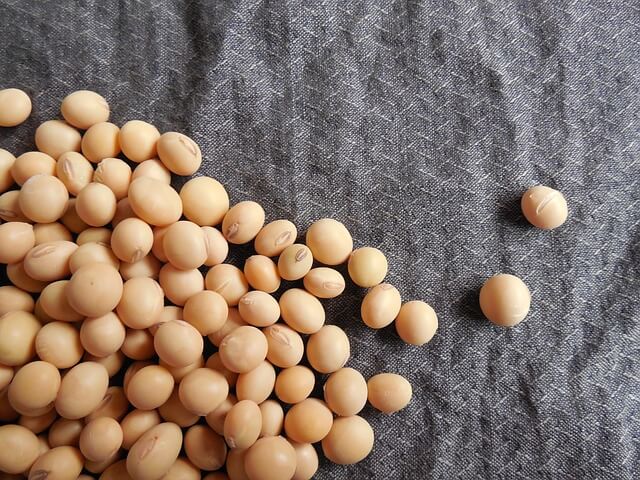
Soy flour is created using dried and milled soybeans and offers many of the same benefits of coconut flour. It typically provides a large amount of protein and is completely free of gluten. It has a large amount of nutritious fiber and adds a nutty and rich flavor to many dishes.
Since soy is one of the only plant sources offering complete protein, it offers a nutritious way to complete many cooked meals. It’s famous for use in low carb baking and can be used to make gluten-free dishes for versatility of application.
Advantages
Soy flour has been shown to reduce the risk of heart disease. The FDA has concluded that using soy proteins in diets with low saturated fats and cholesterol can reduce the risk of coronary heart disease since it can reduce the level of cholesterol in the blood.
Soy flour has also been shown to reduce symptoms of menopause, including mood swings, night sweats, hot flashes, and irritability. It’s gluten-free nature also makes it a top substitute that makes chewy bread and pasta, as well as more elastic dough. When using soy flour instead of coconut flour, you will want to use double the amount while reducing the amount of liquid in a recipe.
Disadvantages
One of the things that may be a downfall when using soy flour is the flavor associated with it. Unlike coconut flour, which has a neutral flavor that blends in with the flavors of a dish, soy flour tends to taste strongly of bean, which may not be the optimal choice for certain recipes. It all comes down to preference and taste in this arena.
Nutritional Breakdown
Soy flour | Amount (per 100 g) | % Recommended daily intake |
Calories | 433 kcal | 21% |
Total fat | 17 g | 20% |
Saturated fat | 3 g | 22% |
Cholesterol | 0 mg | 0% |
Salt | 0 mg | 0% |
Calcium | 197 mg | 20% |
Iron | 7 mg | 0.7% |
Potassium | 1930 mg | 47% |
Carbohydrates | 33 g | 12% |
Fiber | 13 g | 48% |
4. Flax meal🌱
Best for: breading, spreads, soups, and smoothies.
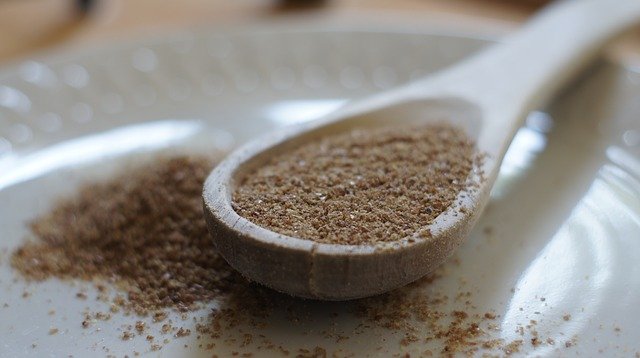
Another of the five best substitutes for coconut flour is one you may not have thought about. Flax meal can be used to replace not only the coconut flour in a beverage or food, but it can also replace the eggs at the same time.
This gives you the option of making an entirely vegan dish without finding a second substitute for the eggs or egg whites in your favorite recipe. Keep in mind that flax meal is simply a version of flax seeds where the seeds are ground before using the ingredient.
Advantages
Studies have shown that flax meal can protect the human body from colon, breast, and prostate cancer. It is also known to help with cardiovascular disease and can improve blood sugar, which is a huge advantage for those with diabetes or prediabetes. This flour also has a decent amount of calories, plenty of healthy fats, and a low amount of sodium to help you keep to a healthy diet.
Disadvantages
While there are several advantages to choosing flax meal instead of coconut flour, it shouldn’t be consumed by anyone who is currently pregnant or breastfeeding. It is also not recommended if you experience irritable bowel syndrome, inflammatory bowel disease, or diarrhea. Flax meal can create increased bowel movement and diarrhea. It also has a laxative effect, which can create discomfort in the stomach.
Nutritional Breakdown
Flax meal | Amount (per 100 g) | % Recommended daily intake |
Calories | 534 kcal | 26% |
Total fat | 42 g | 51% |
Saturated fat | 4 g | 24% |
Cholesterol | 0 mg | 0% |
Salt | 30 mg | 2% |
Protein | 18 g | 36% |
Calcium | 255 mg | 26% |
Potassium | 813 mg | 20% |
Vitamin E | 0.3 mg | 2% |
Vitamin K | 4 ug | 4% |
5. Sunflower seed flour🌱
Best for: cereal, muffins, cookies, and other desserts.
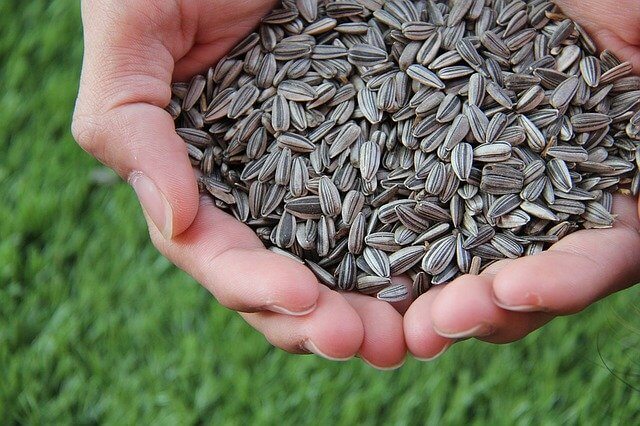
Sunflower seed flour can be bought online or at your local health food market, but it can also be easily made at home for those looking to save money.
This flour is an excellent coconut flour substitute that is made by taking raw sunflower seeds and then grinding them into a fine texture that is similar to traditional flour. This makes it a grain-free flour that has no nuts, and which is low in carbohydrates.
Advantages
There are many nutritional advantages to choosing sunflower seed flour for your cooking and baking needs. The small seeds used to make the flour are excellent sources of vitamin E, B vitamins, and antioxidants that keep your body running in perfect order.
They also offer flavonoids and phenolic acids, which can assist in maintaining a healthy weight and protecting the health of your brain.
Disadvantages
Some might find that the slightly nutty flavor associated with sunflower seed flour isn’t their cup of tea. However, the taste is more neutral than other options such as soy flour. Also, consuming large amounts of seeds can create issues with kidney function.
The flour may also contain numerous calories, so overeating of it can cause weight gain. It also may cause allergic reactions like rashes for some individuals, so be cautious when trying this alternative to coconut flour.
Nutritional Breakdown
Sunflower seed flour | Amount (per 100 g) | % Recommended daily intake |
Calories | 326 kcal | 16% |
Total fat | 2 g | 2% |
Saturated fat | 0.1 g | 1% |
Cholesterol | 0 mg | 0% |
Salt | 3 mg | 0.1% |
Protein | 48 | 94% |
Calcium | 114 mg | 11% |
Iron | 7 mg | 37% |
Vitamin A | 50 ug | 6% |
Vitamin C | 1 ug | 1% |
The Bottom Line
Every substitution is going to have some unique factors, and none of them are going to be entirely the same as using coconut flour. The good news is that the options on this list are relatively similar, and some people may find they enjoy them even more than the original ingredient.
For those who are interested in trying a new type of flour for their baked goods and breading, you will likely find that one of the alternatives listed fits the bill and meets your specific needs.
Top vegan picks
Each of the substitutes you can learn more about above are vegan, so you can choose the one that appeals most to you.
If you’re looking for a recommendation about the best vegan alternative to coconut flour, we would point you in the direction of almond meal, as long as you do not have a nut allergy.
Another top pick is cassava flour if you can get access to it without trouble. For a convenient vegan option, soy flour is available in many places and can even be ordered online without any hassle.
Top healthy picks
As far as the alternatives on this list, most of them are quite healthy, so they aren’t going to cause problems for those looking to lose weight or maintain their current weight.
For those who want to maximize the health benefits, sunflower seed flour is an excellent choice to go with. It has fewer calories and offers many nutrition benefits.
Flax meal can also be one of the healthiest options and has the distinction of being one of the more unique substitutions. Both can be used in several recipes and are versatile while being healthy for your body.
Top convenient picks
When thinking about convenience, you want something easy to find, that works well with your dietary needs, and which has a flavor you enjoy.
The only options that do not fit these criteria are cassava flour, which might be hard to find in some places, and sunflower seed flour, assuming you aren’t interested in making it on your own. Soy flour and almond flour are both available on a widespread basis so you can pick some up quickly and get started with whatever recipe is on your mind.
Top convincing picks
None of the substitutions are going to be exactly like coconut flour, but some of them are more similar than others when you want the same taste and texture for your dishes.
Almond flour is fairly convincing as a coconut flour substitute as it has the same flavor and texture as you expect from the traditional ingredient. Cassava flour is a second option to get the same mouthfeel and taste as coconut flour.
Sources:
https://www.sciencedirect.com/topics/agricultural-and-biological-sciences/soy-flour
https://www.livestrong.com/article/269315-what-are-the-benefits-of-soy-flour/


